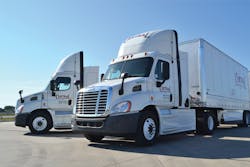Changing distribution patterns and new service needs are bringing about new challenges for less-than-truckload operations, noted Donald A. Orr, chairman and CEO of Central Freight Lines. “There is a lot more to providing pickup and delivery service today than in the past,” he said. “For example, final mile delivery and multi-channel operations can require new approaches to equipment and operating practices and the use of advanced management technologies.”
Over the past few years, Waco, TX-based Central Freight Lines has invested heavily in enterprise management solutions to improve its efficiency and productivity. Recently, the carrier began using Maven Dispatch to automate traditional functions and integrate with onboard telematics systems. The Maven Machines platform incorporates real-time communications and GPS location tracking to trigger automated workflows and uses APIs to integrate with the fleet’s other systems, including ELDs for hours-of-service monitoring and compliance.
“The solution streamlines our daily workflow for planners, dispatchers, and drivers and provides real-time visibility that enables more intelligent route and load planning,” Orr explained. “That lets us more effectively manage freight capacity and accommodate complex operational scenarios involving things like trailer swaps, unscheduled stops, and special equipment needs.”
At Central Freight Lines, the TCG Less-Than-Truckload Cost Information System (LTL/CIS) is used to determine the costs of all shipment activity. “It takes a very sophisticated approach to data management to remain profitable in today’s highly competitive distribution markets,” Orr stated. “With TCG, we have the ability to look at all of our costs, so we can make better operational decisions and set competitive rates based on shipment variances such as the number of pieces we’re handling, weight and density factors, and origin and destination.”
Equal attention is paid to equipment as well. Today, the carrier has over 6,000 tractors, trucks and trailers, and the fleet now includes Sprinter vans with a 12,000-lb. GVWR to address customer needs for same-day deliveries. Additionally, Central Freight Lines has added 20-ft. trucks equipped with extra wide liftgates to meet a variety of freight density and routing needs efficiently in congested areas, and to realize a cost savings on fuel consumption.
One of the carrier’s equipment approaches is to trade tractors every five to seven years, a relatively short cycle for an LTL fleet but one that allows it to add more efficient equipment and safety technologies faster. Central Freight Lines is an active participant in the SmartWay Transport Partnership, which provides resources it can use to reduce fuel use.
The fleet was also one of the first LTL carriers to invest in CNG tractors. Today, along with some of its Texas linehaul operations, almost its entire fleet based in San Antonio and Houston is running on the alternative fuel.
To support its CNG vehicles, Central Freight Lines has built three fueling stations. With 120 private, time-fueled pumps and bays with fast fueling that is open to the public, its station in Houston is the largest in the country. Other stations are located in San Antonio and Fort Worth.
“Sustainability is a key initiative for us, so CNG strengthens and supports our commitment to clean air,” Orr stated. “Even though depending on fuel prices there is not always a financial advantage to CNG, we believe in using domestically produced fuel to reduce foreign oil consumption and support U.S. energy companies, including many that are also our customers.”
Founded in 1925 when W. W. Callan Sr. began using a Ford Model T to pick up and deliver goods between Waco and Dallas, Central Freight Lines now operates 80 terminals in 20 states to serve customers in the Southwest, Southeast and West.
Most recently, the company opened two new logistics hubs in Phoenix and in Perris (CA). Each of the facilities has 130 doors for cross-dock operations, large truck parking areas, and over 10,000 sq. ft. of office space. The hubs support pool and container distribution, customer consolidation, and regional and long haul moves.
* * *
This article originally appeared in the January 2019 edition of Fleet Owner magazine. You can view the digital edition here.
About the Author
Fleet Owner Staff
Our Editorial Team
Kevin Jones, Editorial Director, Commercial Vehicle Group
Cristina Commendatore, Executive Editor
Scott Achelpohl, Managing Editor
Josh Fisher, Senior Editor
Catharine Conway, Digital Editor
Eric Van Egeren, Art Director
